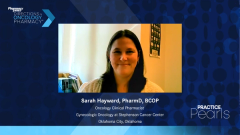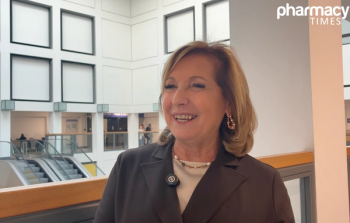
Practice Pearl 3: Provider Education of Emerging PARPi Data for Ovarian Cancer
Sarah Hayward, PharmD, BCOP, leads the discussion on strategies used to keep the healthcare team well-informed and up to date on emerging data about PARP inhibitors for the treatment of ovarian cancer.
Episodes in this series

Jennifer MacDonald, PharmD, BCOP: Sarah and Dr Monk, what strategies do you use to keep yourself up to date on all these evolving and rapidly changing data?
Bradley J. Monk, MD, FACS, FACOG: Go ahead, Sarah.
Sarah Hayward, PharmD, BCOP: Sure. Part of that is just being part of the team. Sometimes it’s an email from Dr Richardson saying, “Look what came out today.” It’s being on listservs, part of SGO [Society of Gynecologic Oncology] that sends you your daily, “Here’s what’s happening in the news in oncology,” and things of that nature. It’s going to meetings and hearing the new stuff that’s coming out. It’s keeping yourself in tune with those publications. Those outlets are going to provide that late breaking information. After that, it happens through the grapevine.
Bradley J. Monk, MD, FACS, FACOG: The team for sure, but also being part of the conversation, right?
Sarah Hayward, PharmD, BCOP: Yes, that’s true.
Bradley J. Monk, MD, FACS, FACOG: I’ve learned a lot from you guys today.
Sarah Hayward, PharmD, BCOP: Yes.
Bradley J. Monk, MD, FACS, FACOG: When you talk to smart people, you might get smarter. The other key point is research. If you invest the time to improve a patient’s life through a clinical trial, you’re very much in tune when that clinical trial reports. Being on the team and part of the conversation are important, but there’s no better way to be sharp than to enroll in a clinical trial. The NCCN [National Comprehensive Cancer Network] recommends that in platinum-resistant recurrent ovarian cancer, the first thing you should do is enroll your patient in a clinical trial. Both of your sites are very good at that. If one of our listeners want to be a GOG Foundation research site, it’s very easy to join, and we need your help.
We’re also going to have some platinum-resistant recurrent ovarian cancer studies report in 2022. You probably already heard earlier this week that in the phase 2 trial of mirvetuximab soravtansine, platinum-resistant recurrent ovarian cancer had a response rate over 30% that was durable and tolerable. That will be the next antibody-drug conjugate [ADC], the first in ovarian cancer. As you know, we’ve had tisotumab vedotin [Tivdak] in cervical cancer since September 20th. But ADCs are the next line antibody-drug conjugates. You’re pharmacists, so you see them in breast cancer, bladder cancer, and liquid tumors. But this is a big thing for us, because antibody-drug conjugates are new for us.
Jennifer MacDonald, PharmD, BCOP: Yes, and that education piece. I was giving my physicians a hard time a couple weeks ago. Obviously cervical cancer had Tivdak, and now with mirvetuximab soravtansine, they both have some eye toxicity. And physicians were like, “That’s a class effect of ADCs.” I was like, “No, that’s not a class effect of ADCs. It’s just unfortunately the 2 that you’ve seen.” But that’s where the education piece and then coming together as a team becomes really great because you can pull from other things you’ve seen. Sometimes as a pharmacist, when we’re BCOP [Board Certified Oncology Pharmacist], I still learn about what’s going on in lymphoma, breast cancer, and all other areas. It’s great to keep up with that literature.
Bradley J. Monk, MD, FACS, FACOG: Absolutely.
Jennifer MacDonald, PharmD, BCOP: Because there are data or agents from there that can be helpful to you in general that might spark ideas for research like, “Why wouldn’t this work for patients with ovarian cancer?” or whatever tumor it might be. That’s obviously what they took from ovarian cancer to some degree with these PARP inhibitors. “Great, what if I use this in prostate cancer and BRCA-mutated or breast cancer and BRCA-mutated?” Keeping up in general is obviously hard to do with oncology, but with other disease states, it can also be really helpful for sparking that idea or thoughts for you.
Bradley J. Monk, MD, FACS, FACOG: But take these 2 examples. In the HER2-mutated uterine serous cancer, there’s so much excitement in HER2-positive breast cancer that can be extrapolated. Trastuzumab [Herceptin]/tucatinib [Tukysa] is an FDA [Food and Drug Administration] approved example, an HER2 antibody-drug conjugate. Or with hormonally responsive breast cancer, there’s the aromatase inhibitor CDK4/6. We can utilize those medications or, to your point, develop clinical trials. I’m doing both to bring you better therapies than trastuzumab in HER2-mutated tumors and better hormonal therapies than megestrol and letrozole. We need to work together. I love to hear what they’re doing in other tumors because they’re more common. And because they’re more common, they’re able to do clinical trials at a different scale. But we’re catching up.
Jennifer MacDonald, PharmD, BCOP: Yes, for sure. I got excited when Keytruda [pembrolizumab]/Lenvima [lenvatinib] got approved for renal cell carcinoma later. I was like, “Great for them!”
Bradley J. Monk, MD, FACS, FACOG: I know. Right?
Jennifer MacDonald, PharmD, BCOP: It doesn’t happen that often, but I was so happy about that when I saw it come through.
Transcript Edited for Clarity
Newsletter
Stay informed on drug updates, treatment guidelines, and pharmacy practice trends—subscribe to Pharmacy Times for weekly clinical insights.






























